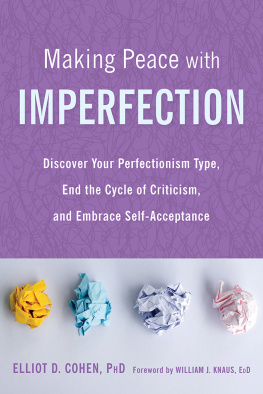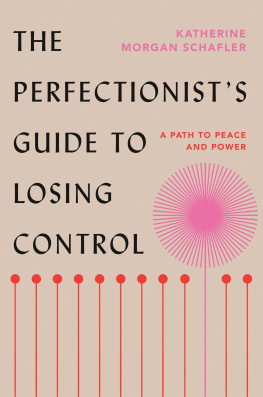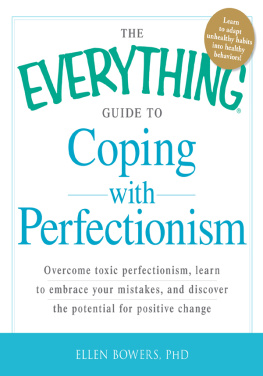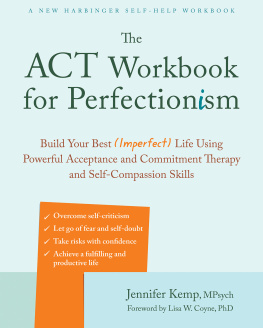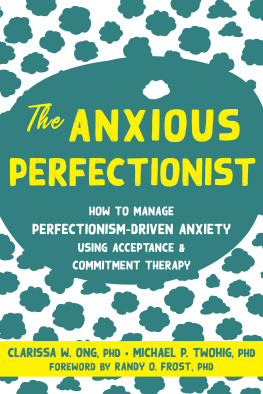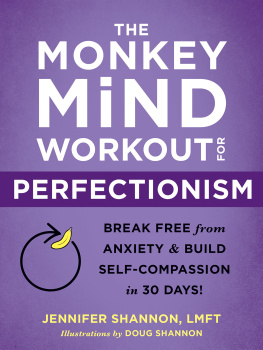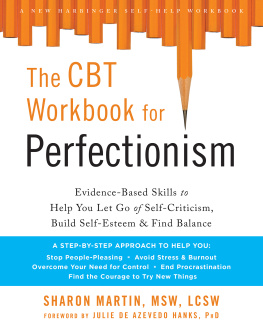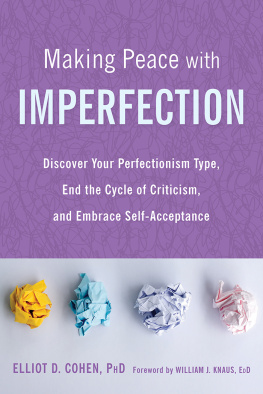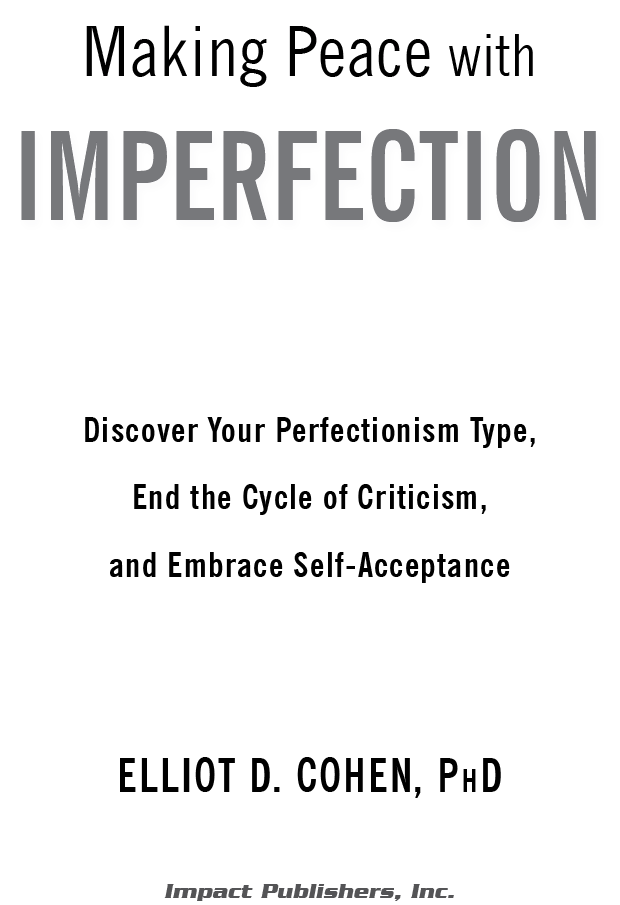In this highly readable, down-to-earth, and practical self-help book, Elliot Cohen skillfully guides the reader through the process of ridding the emotional, behavioral, and interpersonal ravages of perfectionism. Not a one-step-fits-all approach, this book lays out ten discreet varieties of perfectionism for an individual to self-diagnose, and shows how to use a straightforward, six-step method to bring both relief and peace of mind. As a practicing rational emotive behavior therapist, I will make sure to keep copies available for all my patients.
Russell Grieger, PhD , clinical psychologist in private practice, organizational consultant, and adjunct professor at the University of Virginia; author of The Couples Therapy Companion , Developing Unrelenting Drive, Dedication, and Determination , and the forthcoming The Serious Business of Being Happy
Elliot Cohen continues to prove to be the heir to Albert Ellis. In this accessible and instructive new book, Cohen provides hope to those struggling with perfectionism. In extending his logic-based therapeutic approach to combating various forms of obsessionality and self-defeating thoughts and attitudes, he provides a practical six-step method to overcome perfectionistic tendencies and embrace the courage to be imperfect. A classic self-help guidebook.
Jon Mills, PsyD, PhD, ABPP , professor in the department of psychology and psychoanalysis at the Adler Graduate Professional School in Toronto, ON, Canada; and author of Inventing God
An excellent, exhaustive analysis of perfectionism from the perspective of Albert Elliss rational emotive behavior therapy (REBT). Clearly, interestingly, and incisively written, it takes the reader through a guided tour of the various types of perfectionism, the many circumstances under which they occur, their pernicious consequences, and effective strategies for combating them. I highly recommend this book for anyone whose life is diminished by a perfectionistic outlook. You may be surprised by the depth and comprehensiveness of its presence in your own daily functioning.
Michael R. Edelstein, PhD , clinical psychologist, former training supervisor and fellow of the Albert Ellis Institute, and author of Three Minute Therapy
Most books on cognitive behavioral therapy (CBT) are written by psychologists; this one is written by a philosopher with a fine grasp of CBT and psychological issues. Standing on the shoulders of philosophical giants, Cohen takes a compassionate view of the human condition and our tendency to ask too much from ourselves and others. He engages us in the wisdom of historys finest thinkers and greatest achievers, inviting us to choose the paths that lead from our personal perfectionism to greater freedom and enjoyment of an imperfect but worthwhile life.
Irwin F. Altrows, PhD , psychologist in private practice, and adjunct assistant professor in the department of psychology and psychiatry at Queens University in Kingston, ON, Canada
Nobodys perfect, Dad, my then-eight-year-old daughter reminded me decades ago. Alas, many of us make perfect the standard for our own behavior, when excellent, fine, or even good would carry the day. Were human. Everyone makes mistakes.
Making Peace with Imperfection clearly and systematically addresses the destructive beliefs and behavior patterns that cause perfectionism, offering a six-step procedure for dealing with each of the ten types of perfectionism, integrating philosophical insights with empirically validated interventions from rational emotive behavior therapy, and helping readers devise a personalized approach. This book belongs in the personal growth toolbox of everyone for whom perfect is the enemy of good.
Robert E. Alberti, PhD , retired psychologist, professor, author, editor, publisher, and coauthor of Your Perfect Right
A remarkable book, full of helpful techniques for combating the core schema that produce most of the self-inflicted emotional disturbances: perfectionist demands placed on oneself, others, and the world. Especially helpful is the breaking down of perfectionism into the categories of absolutistic needs for achievement, approval, control, and certainty; and how they inevitably produce most emotional disturbances and dysfunctional behavior. The book provides exceptionally helpful rational countermessages for helping people get unstuck from their low self-esteem, depression, anger, anxiety, and low frustration tolerance, as well as techniques to help them better deal with the dysfunctional behaviors that accompany them. Albert Ellis would consider this book as close to perfect as possible in implementing his theory and practice.
Janet Wolfe, PhD , former director of the Albert Ellis Institute
Publishers Note
This publication is designed to provide accurate and authoritative information in regard to the subject matter covered. It is sold with the understanding that the publisher is not engaged in rendering psychological, financial, legal, or other professional services. If expert assistance or counseling is needed, the services of a competent professional should be sought.
Book printed in the United States of America
Distributed in Canada by Raincoast Books
Copyright 2019 by Elliot D. Cohen
Impact Publishers
An imprint of New Harbinger Publications, Inc.
5674 Shattuck Avenue
Oakland, CA 94609
www.newharbinger.com
Cover design by Amy Daniel
Acquired by Jess OBrien
Edited by Kristi Hein
All Rights Reserved
Library of Congress Cataloging-in-Publication Data on file
To the late Albert Ellis, whose rational therapy saved millions from the perils of perfectionism.
Contents
Foreword
Perfectionism is the bane of many who feel pressured, stressed, and miserable because they wrongly make their human value depend on their work performances, how well they get along with others, controlling uncertain conditions, and more. Perpetual stress also is on the horizon for those who expect others to think and behave in a certain way, and for life to unfold blissfully.
Unlike standards for excellence, perfectionism standards for attaining self-worth are preludes for feeling like a failure even if you achieve eminent successes. Worse, striving for something that cannot be detracts from having quality relationships and an enjoyable career. Lessen this toxic form of perfectionism and you can lessen these related problems as well.
There is more. When perfectionism cuts across different forms of depression, anxiety, and other unpleasant states, perfectionism balloons the misery. Decreasing toxic forms of perfectionism can lessen these conditions simultaneously (Lowndes et al., 2018).
As with his exceptional books on other topics, in Making Peace with Imperfectionism Dr. Elliot D. Cohen skillfully explains a six-step method to neutralize destructive perfectionism beliefs. He walks you through each step, using different forms of perfectionism as examples. He describes how you can practice combating perfectionism effectively. This preparation can benefit you in spontaneously arising situations where you might otherwise automatically step into a perfectionism trap.
Dr. Cohen outlines behavioral assignments that you can carry out on your own. Engage in these experiments, and you roll the dice in favor of quicker and more durable freedom from the afflictions of perfectionism. This is not busywork. There is a science behind this classic self-help reading approach. Indeed, active participation in this bibliotherapy process is one of the most productive things you can do to help yourself; perhaps it is the most productive (see Kazantzis et al., 2018).

